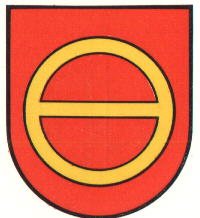Plittersdorf: Difference between revisions
Jump to navigation
Jump to search
Knorrepoes (talk | contribs) No edit summary |
Knorrepoes (talk | contribs) No edit summary |
||
| Line 18: | Line 18: | ||
'''Origin/meaning :'''<br/> | '''Origin/meaning :'''<br/> | ||
The oldest known seal of the village dates from 1558 and already shows the arms with the old village sign. Its meaning is not known, but is similar to the arms of neighbouring | The oldest known seal of the village dates from 1558 and already shows the arms with the old village sign. Its meaning is not known, but is similar to the arms of neighbouring [[Ottersdorf]] and [[Wintersdorf. Later seals sometimes even show the arms shown turned 90 degrees, making the two arms similar. | ||
The arms were officially granted in May 1901, in the colours of [[Baden (State)|Baden]], as no historical colours were known. | The arms were officially granted in May 1901, in the colours of [[Baden (State)|Baden]], as no historical colours were known. | ||
Revision as of 07:09, 4 March 2012
| Heraldry of the World Civic heraldry of Germany - Deutsche Wappen (Gemeindewappen/Kreiswappen) |
PLITTERSDORF
State : Baden-Württemberg
District (Kreis) : Rastatt
Incorporated into : 1972 Rastatt
Official blason:
In Rot ein goldener Sester, quergelegt.
Origin/meaning :
The oldest known seal of the village dates from 1558 and already shows the arms with the old village sign. Its meaning is not known, but is similar to the arms of neighbouring Ottersdorf and [[Wintersdorf. Later seals sometimes even show the arms shown turned 90 degrees, making the two arms similar.
The arms were officially granted in May 1901, in the colours of Baden, as no historical colours were known.
Literature : Zier and Futterer, 1966.

